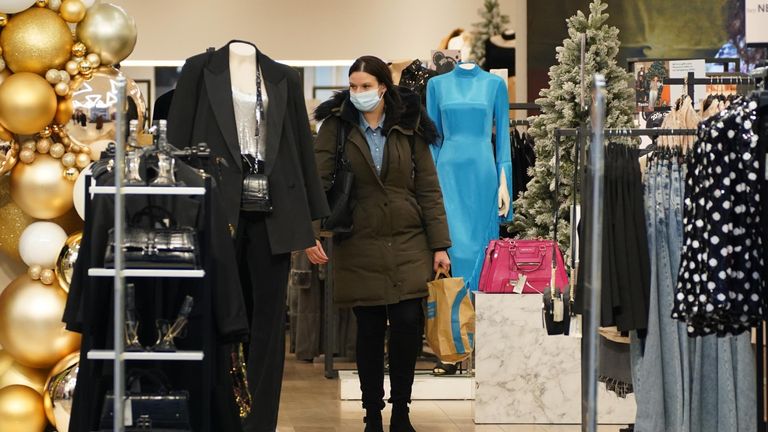Retail and restaurants held back as Omicron dampened appetite for Christmas shopping and parties
Christmas retail and restaurant spending was held back last month as the spread of Omicron and restrictions to tackle it took their toll on shopping and partying, new industry data shows.
Figures from the British Retail Consortium (BRC) and a separate monthly report from Barclaycard revealed how the COVID variant – and measures to tackle it – dampened what is normally a buoyant period for much of the economy.
The BRC’s report, compiled with KPMG, showed retail sales were 2.1% higher than in the same month last year, a slowdown from the 5% growth seen in November and well below the 9.9% growth for 2021 as a whole.
Paul Martin, UK head of retail at KPMG, said the spread of Omicron and updated government guidelines “slowed spending during the final weeks of the year”.
BRC chief executive Helen Dickinson said the figures showed sales had held up despite Omicron, with many choosing to shop online rather than travel to high streets or shopping centres.
But anxiety over the variant was reflected in the goods shoppers bought – with loungewear proving popular as more working from home loomed, while formalwear sales slowed.
Ms Dickinson said retailers now faced a “storm ahead”, with consumer spending this year set to be held back by cost of living pressures including rising energy bills and a national insurance hike.
Separate figures from Barclaycard – which draws on nearly half of the UK’s credit and debit card transactions – illustrated trends in wider consumer spending, taking in leisure and hospitality sectors as well as retail.
They showed spending was up by 12.2% compared with pre-pandemic levels, though that was largely driven by supermarket spending and fuel.
Restaurant spending was 14.1% lower than 2019 levels, a much wider gap than the 3.5% shortfall seen in November while hotels, travel agents and airlines also had a tough month as plans were put on hold.
Card spending in pubs and clubs was 21.2% higher than before the pandemic but that was a slowdown from November’s 35% increase.
Barclaycard found fashion was also a victim, with slowing growth blamed on the cancellation of Christmas parties and events.
The report partly attributed the wider spending slowdown to a strong November which had seen many shoppers do their Christmas shopping early.
Jose Carvalho, head of consumer products at Barclaycard, said: “While consumer card spending levels are up on 2019, December was a mixed picture for retail, hospitality and leisure, as restrictions to tackle the spread of Omicron started to take effect.
“More Brits were either isolating or choosing to stay at home due to the new variant, which hampered face-to-face retailers as well as hospitality and leisure outlets.”
The figures come after data last week suggested the Omicron variant had taken its toll on the number of visits to shopping locations in December, with footfall falling further behind pre-pandemic levels.
A report from data company Springboard said the spread of Omicron coupled with plan B guidance “meant that the natural boost in shopper activity which typically occurs on the run up to Christmas did not materialise”.
Meanwhile, bakery chain Greggs said it saw “more challenging conditions as consumers responded to precautionary messages relating to the new coronavirus variant”.
Source: Read Full Article




